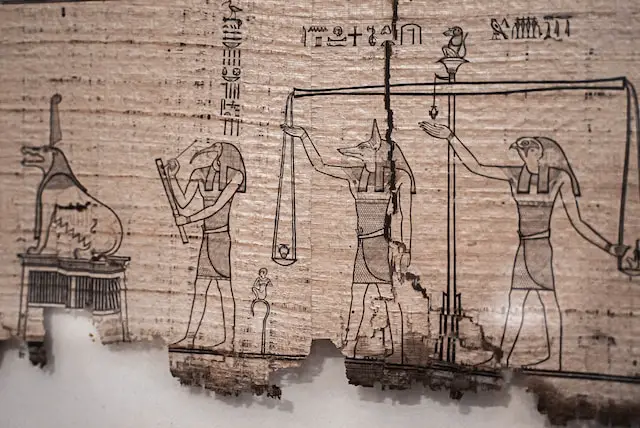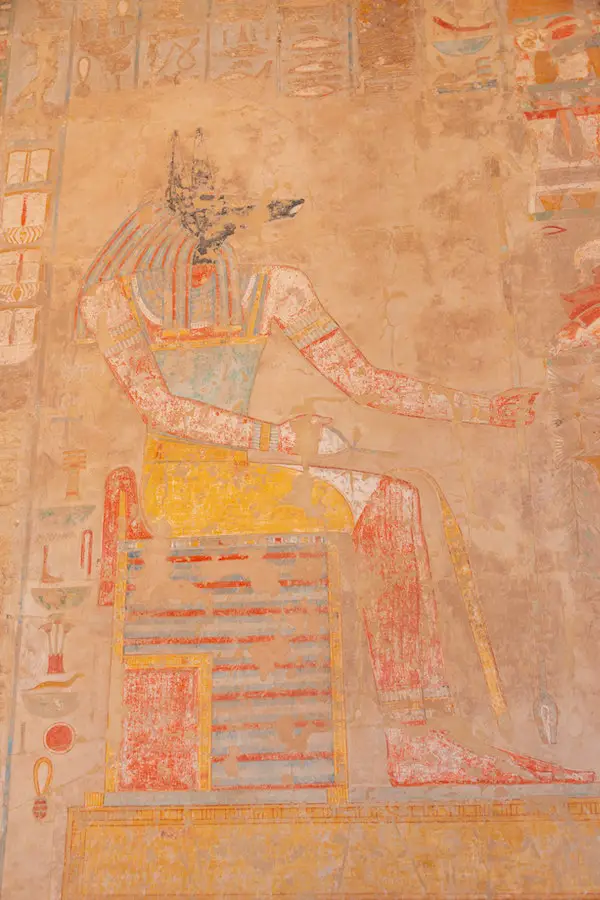
Have you ever found yourself pondering the mysteries surrounding the enigmatic deity of Egyptian mythology, Anubis?
Imagine a remarkable figure, bearing the head of a jackal, standing as the vigilant protector of souls on their intricate journey through the realm of death.
In this exploration, let’s delve deep into the fascinating history, symbolism, and myths that enshroud Anubis, and uncover how this ancient god maintains his power to captivate and influence us even in the present day.
History of Anubis
We should bring an excursion into the chronicles of time and investigate the charming history of Anubis, the ancient Egyptian god who ruled for north of 5,000 years.
To start with, Anubis remained an unfaltering watchman of burial chambers, guaranteeing the protected journey of the left spirits.
As the sands of time drifted, his role expanded to include the oversight of the meticulous mummification process and the delicate task of weighing the hearts of the deceased in the afterlife.
Anubis emerged as a symbol of hope, a beacon guiding souls through the transition from life to death, leaving an indelible mark on our collective fascination that endures even in the present day.
- Read also: How Did Cleopatra Die? Facts Behind Cleopatra’s Death
- Read also: How Did King Tut Die? The History Of Ancient Egypt’s King
Anubis’s Appearance and Symbols
Here’s a concise list of Anubis’s appearance and symbols:
Jackal’s head
Anubis, the ancient Egyptian god of the afterlife, is depicted with a distinctive jackal-headed appearance.
This unique imagery symbolizes his connection to death and the desert, where the harsh landscape represents the challenges of the afterlife.
Anubis, like a wise desert sage, guides souls through this treacherous terrain.
Ankh
The Ankh, often held by Anubis, symbolizes life and underscores his role in the transition to the afterlife.
This ancient Egyptian symbol resembles a key to life itself, conveying the idea that death is not the end but a part of a broader cosmic journey.
Was scepter
The Was scepter, held by Anubis, symbolizes his power and dominion over the afterlife.
It’s a majestic staff that represents his role as both a guide and a ruler in this mystical realm.
The scepter’s forked end maintains the balance between light and darkness in the afterlife, while its crook-like top serves as a guide for souls, much like a shepherd’s crook.
These symbols not only define Anubis’s unique appearance but also represent his dual role as a guardian of the deceased and a guide to the afterlife.
Anubis’s Role in Egyptian Beliefs
In the rich tapestry of Egyptian beliefs, Anubis played a crucial role as a guide, judge, and guardian of the afterlife.
Egyptians believed that upon death, their souls faced judgment by Anubis and other deities.
Anubis’s duty was to weigh the deceased’s heart against the feather of Ma’at, representing truth and justice.
If the heart was lighter, the soul continued its journey in bliss; if heavier, there were consequences.
Anubis also oversaw proper funerary rites, acting as an event planner for the soul’s journey through the afterlife.
His presence ensured that this cosmic transition was not chaotic but a meaningful and well-orchestrated journey in the grand cosmic tapestry of Egyptian spirituality.

Legends and Myths Involving Anubis
Here’s a concise list of some of the myths and legends involving Anubis:
Parentage and resurrection myth
In Egyptian mythology, Anubis is often portrayed as the son of Osiris and Nephthys.
His role in the resurrection myth of Osiris is significant.
This myth involves the dismemberment of Osiris by his jealous brother, Set, and Anubis plays a vital role in gathering and reassembling Osiris’s scattered body parts.
Close associate of Osiris
In Egyptian mythology, Anubis isn’t simply a far-off figure but a nearby partner of Osiris, the divine force of eternity.
Anubis helps Osiris in his revival and assumes an urgent part as a gatekeeper and guide for the departed.
Their partnership emphasizes the interconnectedness of their divine roles in Egyptian belief.
These myths and legends underscore Anubis’s central role in Egyptian mythology and his integral place in the narratives surrounding death, rebirth, and the divine realm.
Anubis’s Influence Beyond Ancient Egypt
Anubis, the jackal-headed deity from ancient Egypt, has left an indelible mark on modern culture.
His image and symbolism have found their way into movies, literature, and contemporary spiritual practices, transcending the confines of history.
This enduring influence reflects the timeless appeal of ancient myths and their ability to capture the human imagination.
Anubis serves as a bridge between our primal questions about life and death and the wisdom of Egypt’s past, reminding us of our shared human heritage.
His continued presence in our modern world is a testament to the lasting power of myth to resonate across time and cultures.
- Read also: How Old Are the Pyramids? The Secrets Revealed
- Read also: Unraveling the Mysteries of Ancient Egyptian Tombs
Conclusion
As we’ve embarked on our journey into the enigmatic realm of Anubis, we’ve unveiled the layers of his history, his distinctive appearance, and the profound significance he holds within Egyptian mythology.
Anubis, with his jackal-headed visage, emerges as the stalwart guardian of the afterlife, intimately linked with the intricate world of funerary rites.
His presence in enduring myths solidifies his status as an icon of unparalleled stature.
As we continue to navigate the rich tapestry of human mythology, Anubis serves as an enduring testament to the timeless influence of ancient beliefs that continue to captivate our imagination.
FAQs
Anubis is an ancient Egyptian deity known as the god of mummification and the afterlife. He is often depicted with the head of a jackal and played a crucial role in guiding souls through the afterlife.
Anubis is often depicted holding the Ankh, a symbol of life, and the Was scepter, representing power and dominion over the afterlife.
Anubis played a pivotal role in Egyptian beliefs, where he judged the souls of the deceased and ensured they received proper funerary rites for a successful transition to the afterlife.
Anubis is associated with several myths, including being the son of Osiris and Nephthys or assisting Osiris in the resurrection myth, highlighting his significance in Egyptian mythology.
Anubis’s imagery and symbolism have permeated popular culture, appearing in various forms of media and even modern spiritual practices, showcasing his enduring influence.



